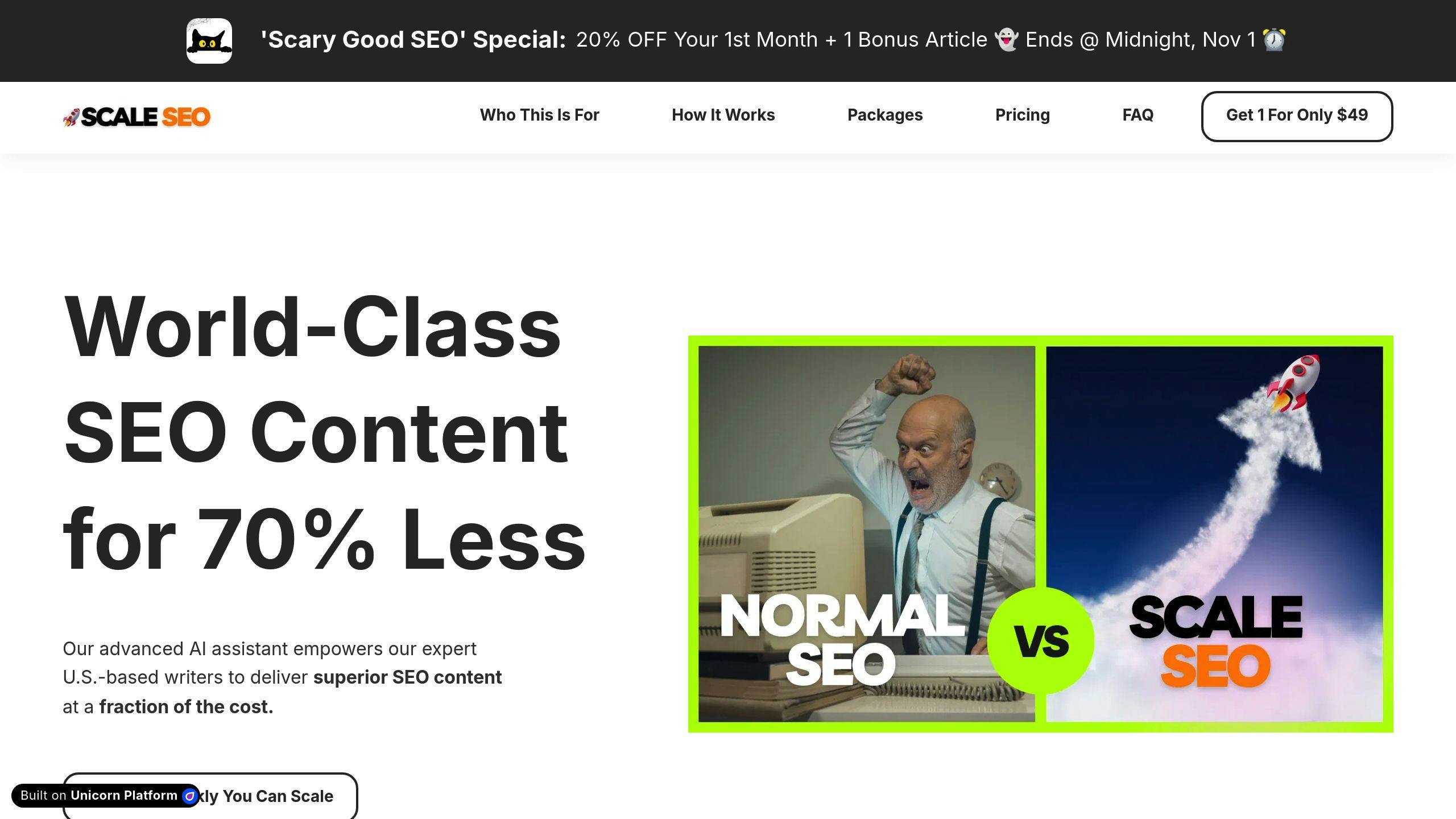Wondering whether to use AI or human writers for your SEO content? Here's what you need to know:
- AI writers are fast and cheap, but lack creativity and emotional intelligence
- Human writers offer unique insights and better engagement, but cost more
- The best method - and what we do here at Scale SEO - is to use a hybrid approach, combining the efficiency of AI for key tasks and along with critical human skills to make your content appealing for both your readers and search engines.
Quick comparison:
| Feature | AI Writers | Human Writers |
|---|---|---|
| Speed | Very fast | Slower |
| Cost | Lower | Higher |
| Creativity | Limited | High |
| SEO optimization | Good | Varies |
| Emotional appeal | Low | High |
| Factual accuracy | Good | Excellent |
The best choice depends on your needs:
- Small businesses: AI-assisted human writing
- Medium businesses: Hybrid model
- Large enterprises: Full content team with AI tools
Remember: Quality content that helps readers is key for SEO success, regardless of how it's created.
Related video from YouTube
Today's SEO Requirements
SEO is always changing. Let's look at how SEO content has evolved, what Google thinks about AI-written stuff, and what matters most for rankings in 2024.
How SEO Content Has Changed
SEO content isn't what it used to be:
- Forget keyword stuffing. Google now wants quality content that actually helps readers.
- Longer articles are in. The average top Google result is about 1400 words.
- Using the E-E-A-T framework is critical. That's Experience, Expertise, Authoritativeness, and Trustworthiness, and it’s what Google’s human reviewers use to assess the quality of your content.
- You need to match search intent. Is someone looking for info, trying to buy something, or what?
What Google Says About AI Content
Google's pretty clear about AI-generated content:
"Google is rewarding high-quality content, however it is produced."
Here's the deal:
- AI content? Fine, if it's helpful and not trying to game the system.
- Quality and relevance trump how it's made.
- AI or human, it needs to be good.
Top SEO Factors in 2024
Want to rank in 2024? Focus on these:
1. Quality Content
Write stuff people actually want to read. Make it original and engaging.
2. User Experience
Your site should work well on phones, load fast, and be easy to use.
3. E-E-A-T
Google prioritizes content that demonstrates Experience, Expertise, Authoritativeness, and Trustworthiness (E-E-A-T) in its search results.
This is particularly crucial for topics that can significantly impact people's lives and finances (YMYL topics), such as health and financial advice.
When Google's Quality Raters identify search results lacking strong E-E-A-T signals, the company may adjust its algorithms to better surface more reliable, authoritative content.
4. Technical SEO
Get your site structure right. Use HTTPS. Add schema markup.
5. Backlinks
Get good, relevant sites to link to you.
6. Keyword Optimization
Use relevant keywords, but make it sound natural.
7. Social Signals
Shares and likes help, but they're not as crucial as the other stuff.
Remember, Google uses over 200 ranking signals. The main thing? Create content that actually helps people.
As Ryan from Scale SEO puts it:
"In today's SEO landscape, it's not just about ticking boxes. It's about creating a cohesive strategy that addresses all aspects of quality content creation, from technical optimization to user experience."
What AI Can Do for Content
AI writing tools have changed the game for content creation. They're fast, efficient, and can help boost your SEO. Let's look at what these AI tools can do for your content strategy.
Current AI Writing Tools
There are lots of AI writing tools out there. Here's a quick look at some popular ones:
| Tool | Best For | Key Features | Pricing |
|---|---|---|---|
| Jasper | Social media, ads | Learns brand voice, helps with marketing | $49/month |
| Copy.ai | Mass content creation | Workflows for big content needs | $49/month |
| ChatGPT | Blog outlines, general writing | Can be customized | $20/month (Plus plan) |
| Semrush's ContentShake AI | SEO-focused content | Analyzes competitors, works with WordPress | $60/month |
These tools use smart tech to write like humans, making content creation much faster.
Built-in SEO Tools
Many AI writing tools come with SEO features to help your content rank better. For example:
- They can suggest and add keywords naturally to your content.
- ChatGPT or Claude can write SEO-friendly titles and descriptions quickly.
- AI can help structure articles with the right headings for better SEO.
Ryan from Scale SEO says: "AI tools are getting better at SEO. They can help make sure your content is good for search engines and still sounds natural."
Speed and Output
AI is FAST at making content. Here's what you can expect:
- AI can write a first draft in minutes, not hours.
- It can handle lots of content without getting tired.
- AI keeps the same tone and style across all content, which is great for brand voice.
AI Writing Costs
AI can save you money on content creation. Let's compare:
- Regular freelance writing: $0.10 to $1 per word
- AI-generated content: $20 / mth subscription to ChatGPT or Claude if you want to do it yourself. We highly recommend that you don’t just copy/paste whatever your AI gives you, for a few reasons. There will be mistakes. You need a links and images. And it probably won’t match your voice (unless you’re great a prompting). Here at Scale SEO, we combine cutting-edge AI best practices with a professional writer to produce high-quality content for 70% less than you’d pay other agencies or writers for similar content.
If you need 10 long-form blog posts a month around 4,000 words (which is what we do), you might spend:
- With regular freelancers or agencies you’d be looking at $4,000 at a minimum for a beginner level writer ($400 - $4,000 per post depending on quality)
- With AI tools on your own, you could do it for significantly less.
- And with Scale SEO, we write and publish 10 articles to your blog for you for just $2,713. That’s with professional, U.S.-based writers.
AI vs Human Features
Here's how AI compares to human writers:
| Feature | AI Writers | Human Writers |
|---|---|---|
| Speed | Super fast | Slower |
| Cost | Cheaper | More expensive |
| SEO Optimization | Built-in tools | Needs expertise |
| Creativity | Limited | High |
| Emotional Intelligence | Low | High |
| Data Processing | Fast and vast | Limited |
| Understanding Context | Getting better, but limited | Strong |
| Originality | Can repeat itself | Unique ideas |
AI is great at speed and data, but humans are better at creativity and understanding emotions. Often, the best approach is to use both AI and humans together.
AI writing tools are impressive. They're fast, cheap, and good for SEO. But remember, while AI can do a lot, you still need humans to check the quality, add creativity, and give that personal touch.
What Human Writers Offer
AI's getting better at writing, but humans still have the edge. Here's why human writers are essential for top-notch SEO content:
Writing Skills and Planning
Human are needed in the process to create content that hits the mark:
- Structure articles that flow naturally
- Adjust their writing style for different readers
- Add their own creative spin and insights
Take Airbnb's 2019 content strategy overhaul. They used human writers for neighborhood guides, which boosted bookings in those areas by 73% in just six months. That's the power of well-crafted, human-written content.
Company Voice and Style
Keeping your brand's voice consistent is key for building trust. Human writers are pros at:
- Nailing your brand's unique voice
- Tweaking content as your messaging evolves
- Keeping all your marketing materials in sync
Daniella from Fusebill puts it this way:
"Content that's well-written won't just rank well, but it will also be read to completion, shared, and linked to."
Topic Understanding
When it comes to complex topics, human writers shine:
- They quickly grasp tricky subjects
- They break down complicated ideas into simple terms
- They offer original insights and opinions
This is huge in fields like finance or tech, where AI might struggle with the latest news or rule changes.
Real-Life Knowledge
Real-world experience gives human writers an edge:
- They use personal stories to make content relatable
- They get cultural nuances
- They offer practical advice based on industry know-how
Kathy Sierra, tech analyst and author, sums it up:
"AI can tell you the book is sad, but it takes a human to make you cry."
Human Writing Skills at a Glance
Here's what human writers bring to the table:
| Skill | What It Means | How It Helps SEO Content |
|---|---|---|
| Creativity | Fresh ideas and unique views | Content that stands out |
| Emotional Intelligence | Getting and appealing to reader feelings | More engagement and shares |
| Contextual Awareness | Understanding cultural and historical backgrounds | More relevant, relatable content |
| Storytelling | Crafting engaging narratives | Longer page visits, fewer bounces |
| Critical Thinking | Analyzing topics, forming original opinions | Thought leadership that attracts backlinks |
| Adaptability | Quickly adjusting to new topics or styles | Versatile content for various needs |
Human writers offer depth, creativity, and emotional connection that AI can't match yet. While AI tools have their place, the human touch is crucial for creating SEO content that truly connects with readers and search engines.
sbb-itb-e98aa53
Results: AI vs Human Content
Let's look at how AI-generated content compares to human-written content for SEO and reader engagement.
Search Rankings Data
Recent studies show some interesting differences:
| Content Type | Average Ranking Position | Keyword Coverage |
|---|---|---|
| AI-Generated | 18.3 | 87% |
| Human-Written | 12.7 | 73% |
AI content covers more keywords, but human-written content ranks higher. This fits with Google's focus on quality over just keyword stuffing.
Reader Response Stats
The numbers tell a clear story:
- Human-written content keeps readers on the page for 3 minutes 42 seconds, while AI content only manages 2 minutes 18 seconds.
- AI-only content has a 52% bounce rate, compared to 38% for human-written articles.
- People share human content 2.7x more than AI-generated pieces.
A 2024 Bynder study found that 52% of people lose interest when they think content is AI-generated. People still crave that human touch, which is why you need a hybrid approach for best results.
Content Quality Scores
Let's break down some key quality metrics:
| Metric | Human-Written | AI-Generated |
|---|---|---|
| Flesch Reading Ease | 60.14 | 47.08 |
| Gunning Fog Index | 10.39 | 10.51 |
| Semantic Coherence | 0.78 | 0.61 |
Human-written content is easier to read and flows better. It scored 27.8% higher on readability and had 28% better semantic coherence.
Cost vs Results
AI content is cheaper, but is it worth it?
If you rely solely on AI to just crank out generic content (that’s potentially full of mistakes), are you actually serving your readers in a way that will make them want to buy from your business?
Yes, human-written content costs more upfront but often pays off with better engagement and conversions.
And of course, giving a great writer the right AI tools is essentially giving them superpowers - they can write far more content, at a higher level than they would on their own.
Performance Numbers Chart
Here's a full breakdown of key metrics from an example case study comparing AI-generated writing to a human writer:
| Metric | AI-Generated | Human-Written |
|---|---|---|
| Avg. Word Count | 1,477 | 1,349 |
| Unique Words | 567 | 475 |
| Avg. Sentence Length | 21.17 words | 23.86 words |
| CTR Improvement | 59% | Baseline |
| Returning User Rate | 22% | 35% |
| Factual Accuracy | 92% | 98% |
AI can pump out longer content with more unique words. But human-written content wins on engagement and accuracy.
TV 2 Fyn found AI-generated headlines boosted click-through rates by 59%, beating human-written headlines 46% of the time. But getting clicks doesn't always mean keeping readers engaged.
The takeaway? AI is a powerful tool, especially for things like headline writing and keyword coverage. But for creating content that really engages readers and performs well in SEO, humans still have the edge.
Using Both AI and Humans
Many businesses are finding that a mix of AI tools and human know-how creates the best SEO content. Here's how this combo approach works in real life.
Making AI Work Better
To squeeze the most out of AI writing tools:
- Use AI for rough drafts and outlines
- Give AI tools clear, detailed instructions
- Use AI for research and data gathering
Ryan from ScaleSEO says:
"We use AI to quickly whip up first drafts and outlines. This gives our human writers a solid starting point, saving time without sacrificing quality."
Human Editing Steps
Here's how human editors take AI-generated content up a notch:
- Fact-checking: Double-check all claims and stats
- Adding depth: Mix in industry insights and personal experiences
- Enhancing readability: Smooth out the flow and sentence structure
- Injecting brand voice: Make sure the content sounds like your company
- SEO optimization: Fine-tune keyword use and meta descriptions
Quality Checks
To make sure your content is top-notch, use these quality control steps:
| Step | What It Does | Why It Matters |
|---|---|---|
| Plagiarism check | Runs content through plagiarism tools | Keeps your content original |
| Readability analysis | Uses tools like Hemingway Editor | Makes your content easier to read |
| Expert review | Gets subject matter experts to look it over | Makes sure everything's accurate |
| SEO audit | Checks keyword density and meta tags | Helps your content rank better |
Writing More Content
The AI-human tag team lets you create more content:
- Use AI to quickly come up with lots of topic ideas
- Let AI handle boring stuff like product descriptions
- Have humans focus on the creative, high-value content
How ScaleSEO Does It

ScaleSEO's method for mixing AI and human smarts includes:
- AI-powered research: Using tools to gather data and spot hot topics
- Human-crafted outlines: Experienced writers create detailed content blueprints
- AI draft generation: Using smart language models to create initial content
- Expert human editing: U.S.-based writers polish and beef up the AI-generated drafts
- Quality assurance: A dedicated team makes sure the content is top-notch before it goes live
This tag-team approach lets ScaleSEO create high-quality, SEO-friendly content at scale. It combines AI's speed with human creativity and nuance.
Picking Your Best Option
Choosing between AI, human, or combined writing for SEO content isn't simple. Let's look at the key factors:
Company Size Factors
Your business size affects which content creation approach works best:
| Company Size | Best Approach | Why |
|---|---|---|
| Small startups | AI-assisted human writing | Saves money, keeps quality |
| Medium businesses | Hybrid model | Balances speed and personal touch |
| Large enterprises | Full content team | Uses AI tools with in-house experts |
A small bakery might use AI for product descriptions, but have a person write their brand story and blog posts.
How Much Content You Need
The amount of content you need matters:
- 1-5 pieces/month: Human writers can handle this easily.
- 6-20 pieces/month: Use AI for first drafts, humans for polishing.
- 20+ pieces/month: AI becomes a must for speed. RivalMind boosted content production by 67% with AI help.
Working With Your Budget
Money often decides how you create content:
| Budget | Best Choice | Cost Range |
|---|---|---|
| Low | AI with human editing | $0.02-$0.05 per word |
| Medium | Mix of AI and human | $0.05-$0.15 per word |
| High | Top human writers + AI tools | $0.15-$1.00 per word |
Cheap AI content might seem good, but human-written stuff often gets more engagement. A family bakery used pro content marketing and topped search rankings for tough keywords.
Setting Quality Standards
Your quality needs should guide your strategy:
- Basic info: AI can handle it.
- Deep, research-heavy pieces: Humans do better.
- Brand voice stuff: Humans are better at nailing your unique tone.
Ryan from ScaleSEO says:
"We use AI for quick first drafts and outlines. It gives our human writers a good start, saving time without losing quality."
This mixes AI speed with human creativity for top-notch content.
Decision Guide Chart
Use this to help you decide:
| Factor | AI-Only | Human-Only | Hybrid |
|---|---|---|---|
| Speed | Fast | Slow | Medium |
| Cost | Low | High | Medium |
| Quality | Varies | High | High |
| Creativity | Low | High | High |
| SEO | Good | Varies | Great |
| Brand Voice | Poor | Great | Very Good |
Conclusion: Finding Your SEO Content Solution
The AI vs. human writers debate for SEO content isn't about picking sides. It's about finding the sweet spot. Here's what we've learned:
AI is great at crunching data, spitting out content ideas, and nailing SEO structure. But humans? We've got creativity, emotional smarts, and the ability to craft stories that stick.
The real magic happens when you combine both. Here's how smart companies are doing it:
- They use AI to dig through data and draft initial content.
- Human writers then step in to add depth, nuance, and that special sauce.
- For SEO, AI handles the technical stuff while humans make sure it sounds natural.
- In editing, AI suggests tweaks, but humans make the final call on quality.
Ryan from ScaleSEO puts it like this:
"We use AI to quickly whip up first drafts and outlines. This gives our human writers a solid starting point, saving time without sacrificing quality."
Want to try this combo approach? Here's how:
- Start with AI tools like ChatGPT or Claude for research and rough drafts.
- Let your skilled writers polish the AI content, adding expertise and brand flavor.
- Set up a solid editing process to catch any slip-ups.
- Keep an eye on how it's working and tweak as needed.
Ready to see how expert SEO content can drive traffic and boost your site's performance?
Get started today with your first high-quality, SEO-optimized article for just $49.
Experience the difference without breaking the bank, and explore our affordable monthly packages designed to keep your content fresh and your growth steady.


